Previously on Drokk!: After the Garth Ennis years and a tease of a Mark Millar era — not to mention an increasing reliance on formula, rendering the series surprisingly stale — Dredd co-creator John Wagner has returned to guide the character in both 2000 AD and Judge Dredd Magazine, which should be a good thing, right…? Right…?

0:00:00-0:06:33: This time around, we’re talking about Judge Dredd: The Complete Case Files Vol. 22, which collects material from 1993 and 1994, and sees Wagner firmly re-established as the primary writer of the strip (although others, including Peter Hogan and the recently departed Si Spencer, show up as well). I talk about the reasons I like the book, although Jeff isn’t convinced by either my arguments or Wagner’s attempts to break with the conventions of the strip. Is this the second schism volume in a row?

0:06:34-0:25:23: It only makes sense that we tackle the low point of the volume immediately, so we deal with “Crusade,” a Grant Morrison/Mark Millar serial that massively outstays its welcome, even with art by Mick Austin. We talk about the unexpected Pat Mills influence (especially Nemesis the Warlock), and about Mark Millar’s faith and how that plays into his writing (or doesn’t, as the case may be). We also talk about bad design choices, and the ways in which something can be “not boring,” but that doesn’t necessarily make it interesting, either. Suffice to say: we didn’t like “Crusade” at all.
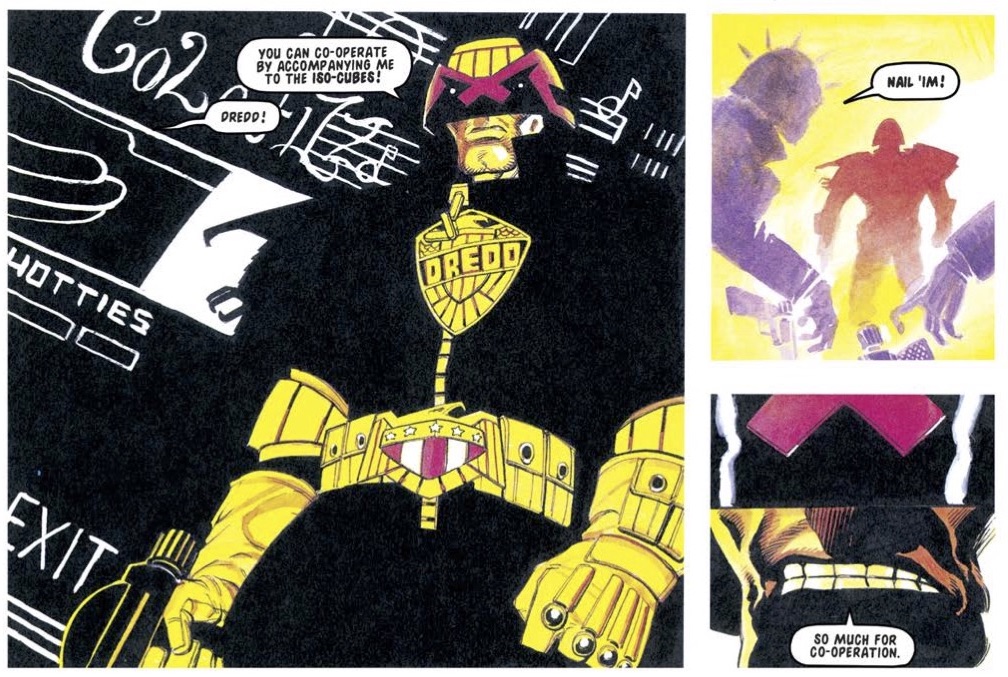
0:25:24-0:38:55: We move on to “Escape from Kurt Russell,” a John Wagner/Paul Marshall short that has some interesting choices in terms of tone — we discuss whether or not the denouement is a pisstake, a joke, or just a strange idea — and perhaps a coded message to Frank Miller of all people. Perhaps more importantly, it’s also a story from 1994 that previews the plot of 2012’s Dredd movie, which neither of us expected at all, although Jeff points out in passing that there’s also a Mister Miracle Kirby influence at play that I didn’t see at all.
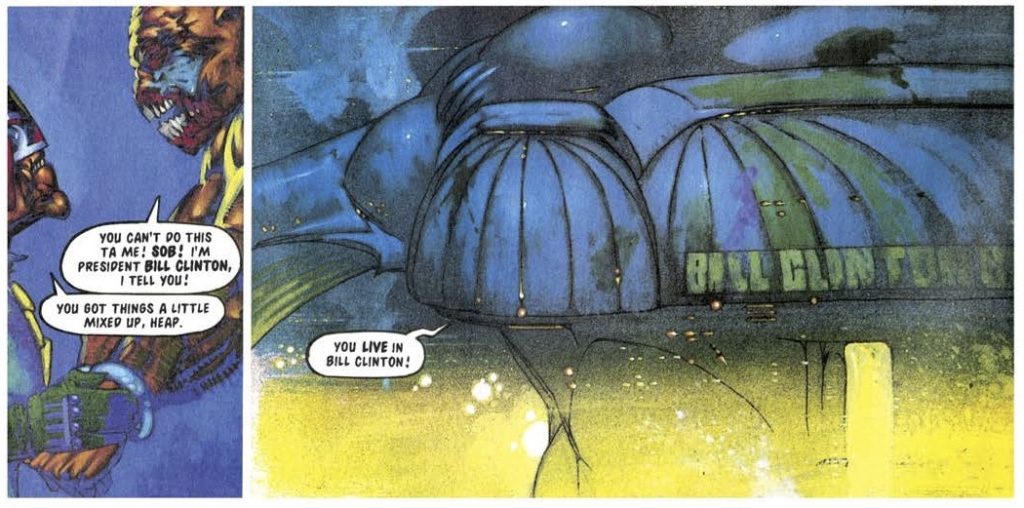
0:38:56-0:59:19: A quick spin through the majority of the other stories in the volume sees us talk about the fact that so much of this book is just… fine, which is far from a selling point. Under some discussion is the self-conscious darkness of the Magazine material from this era, the oddness that is the Bill Clinton cameo in one episode, and my theory about the real reason why John Wagner returned to Dredd — and what that might mean about the “Candidates”/“Voting Day” storyline that opens this collection.
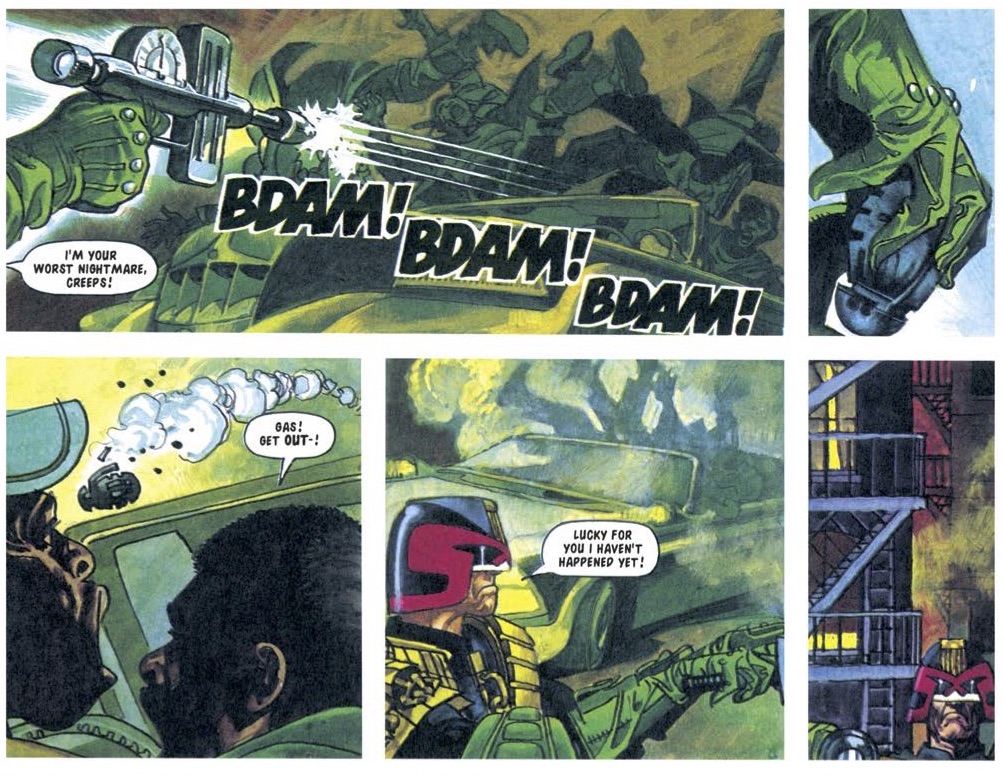
0:59:20-1:41:52: The meat of the episode is exactly what Jeff thought it would be: “The Exterminator,” a ten-episode story that entirely drops the Dredd formula in favor of… a Terminator pastiche, of all things. I love it, but Jeff is less sure, and we talk about why, as well as Jeff’s ambitious theory about what the story is actually about. Also discussed: Wagner’s awareness of racial themes and police complicity in oppressive status quos; whether or not John Wagner is purposefully trolling the makers and cast of the 1995 Judge Dredd movie with this story; editorial oversight and overreach; the parallels this serial has not only with Terminator, but also Alien; Wagner’s interest in time travel and the ways in which it could have been used more appropriately, or at least interestingly, in this particular story, and far, far more. It’s definitely Wagner trying something different with the strip, but is that enough to make it a worthwhile excursion?
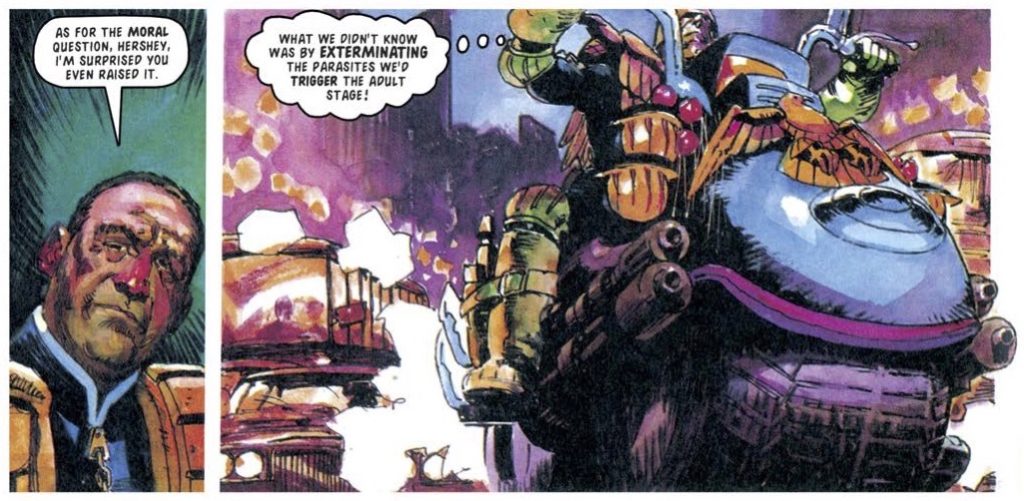
1:41:53-1:47:38: So, is this book Drokk or Dross? Both of us go for the former option, although Jeff finds it a more perilous proposition than I do. We don’t do the traditional mentioning of our favorite stories from the volume, but I’d already plumped for “The Exterminator,” and Jeff elsewhere describes it as Wagner’s potential masterpiece, so… let’s just say that’s his choice, too. (He also talks about his love for “Crash Diner,” a Wagner/Cyril Julien short from the Magazine, so perhaps that’s his choice.) Also discussed: a brief mention of what we’ll be reading next episode, which includes a return of Bill Clinton of all people…
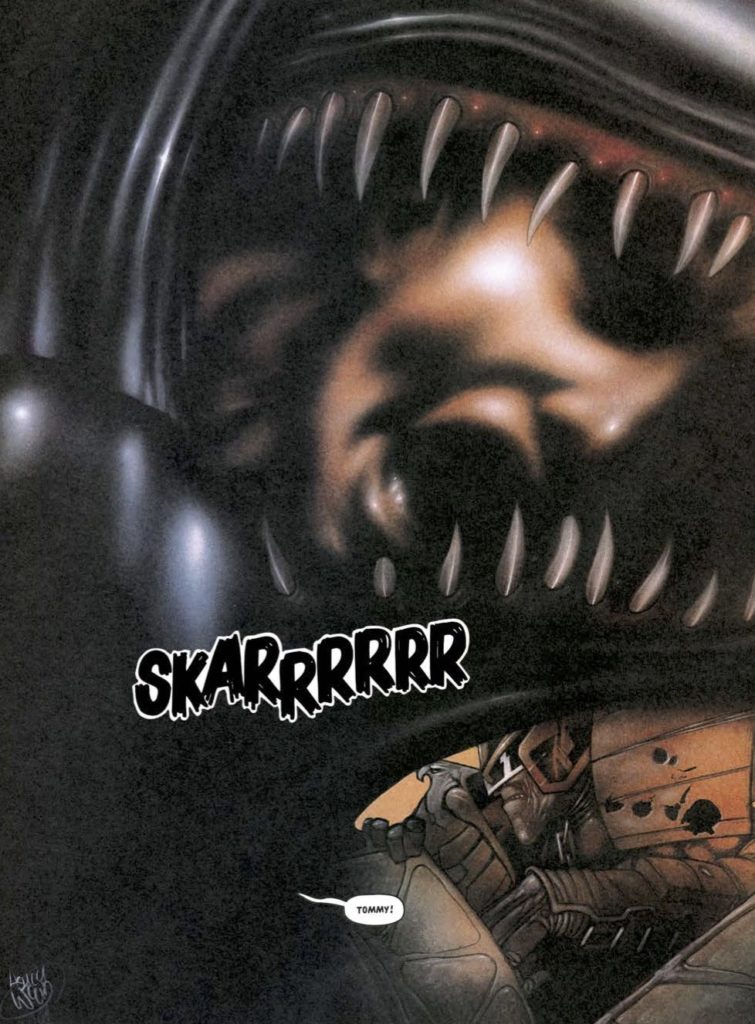
1:47:39-1:51:54: Jeff suddenly realizes that we didn’t really talk about the art in this volume as much as usual, and singles out some terrible Ashley Wood, work, some great Dean Ormston and Dermot Power work, and John Burns and Emilio Frejo’s art from “The Exterminator.” There’s also a Garth Ennis slam, just because.

1:51:55-end: We wrap things up the way we always do, by mentioning the Tumblr and Instagram that I haven’t updated in forever — I’ll change that soon, I swear — as well as our Twitter and Patreon accounts, and Jeff sings us out beautifully. We’ll be back in a month, when we’ll have to deal with checks notes new Pat Mills and Garth Ennis Dredd…? As always, thank you for listening and reading along.
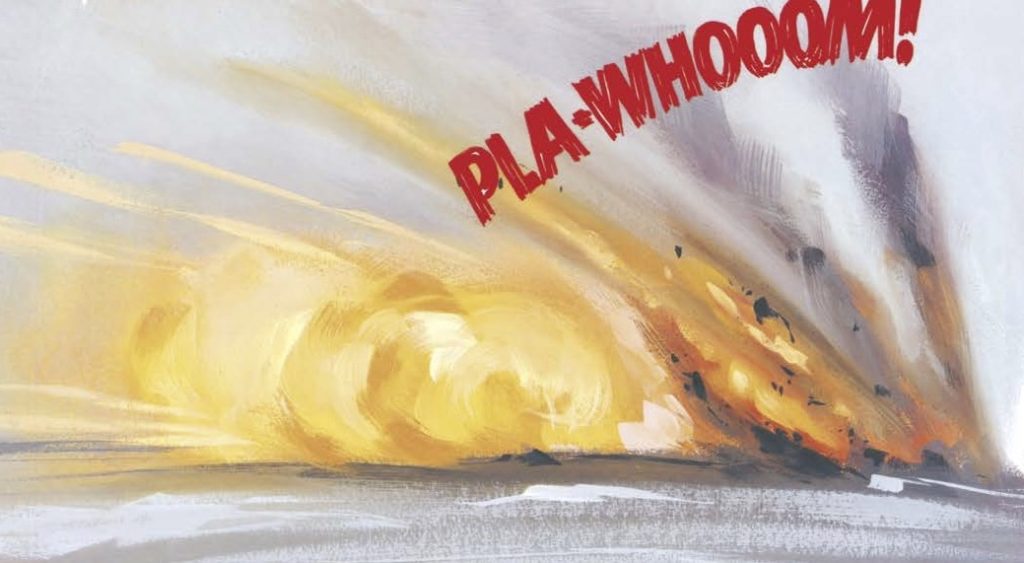


Direct link to the episode for those that want it! https://theworkingdraft.com/media/Drokk/DrokkEp25.mp3
So in Jeff’s analysis of the Exterminator, racism is a parasite within us that we ignore, but erupts in the future to destroy us all? Bit of a stretch, surely?
In regards to the Exterminator story and Wagner’s cinephilea, I wonder whether this story is a commentary on both Robocop, probably the best cinematic adaptation of Judge Dredd to ever hit the screens, and Richard Stanley’s 1990 film Hardware, and how the former, for all everyone pointing out the similarities to Dredd, went unscathed, while Fleetway successfully sued Stanley over the similarity to a little known Judge Dredd Annual 1981 four page story by Kevin O’Neill called Shok!
I’d also be interested to discover when Exterminator was written as before Stallone’s casting much of the press speculated that the role was perfect for Schwarzenegger.
While reading this volume I really wondered what the context was for some of it. Who was the audience for the Megazine at this time? Was it comic fans? Or was it people who bought it along with the latest issue of Kerrang! (I’ve read Thrill Power Overload, but I can’t remember if it goes into this.)
While for me this volume was drokk, I think Graeme summed it up best by saying when the highs have been so high, encountering a volume that’s just fine can feel like a letdown. To me, however, after 5 or 6 volumes of mediocre to bad Dredd, I’m willing to take it. I think Jeff might have inadvertently hit the nail on the head when he equated some of the stories herein to superhero fare, and if by that he meant they were treading water, I definitely felt that. Where the letdown for me really hits hard is not in the inherent quality of the stories, for when Wagner pens a tale I can always find something worthwhile to latch on to, but in the lack of progression on the story Wagner began with Letter from a Democrat and that continued through America. Not only was this thread cut short by the inept handling of Ennis, we haven’t even properly returned to it. A lot of the stories in here felt like classic Dredd tales of Megacity-1, but, really, after Wagner introduced the thread of how the power structure with the judges functions in the city and how the citizens are oppressed by that, well, that’s all I want to see. Maybe I’m being selfish; maybe the editors of 2000 A.D. only want the illusion of change and not real change. To me Dredd is starting to feel like other media where a story hints about being about something, but then explores uninteresting avenues, or avenues that are uninteresting to me. Imagine if Uncut Gems promised you the story of Adam Sandler’s character, but we ended up getting the story behind the school play his daughter was in and all the stuff we know about the film just happened in the periphery.
I also wasn’t sure what was up with the Judge Pal and the Bill Clinton stories. In the former the kidnappers appeared to be mutants, and in the latter the guy who swapped bodies with Clinton looks like a mutant. I thought mutants were illegal in Megacity-1. (Oh, god, I hope I’m not becoming a continuity scold.)
There was some nice art in this issue. Even Ashley Wood had some nice panels of Dredd even if storytelling and him don’t appear to be on speaking terms. My favorite panel by far was in the in chief judge vote story where Dredd is being question by the press, and his head is being framed by the newspaper that would print the article, thus getting two panels for the price of one. I thought that was just so nicely done. The panel you have in this post from Escape from Kurt Russel with Dredd just a black silhouette and the gold on his uniform popping brightly was absolutely perfect.
Finally, Executioner. I too liked that it was a change, but I dunno, I found it lacking in execution maybe? I think Occam’s Razor would have it that Wagner was Terminator or the sequel, and he thought, “What if Terminator, but the terminator is actually doing a good thing to save the future?” or something along those lines. Not really sure when it was written, but here’s timeline that seems of interest.
Predator 2 was released in 1990, starring Danny Glover as a cop in LA during a heatwave. The Dark Horse comic it’s based on, however, takes place in New York. Was Glover’s character the influence for the one detective?
Terminator 2 was released in 1991 and was, to say the least, a pretty big deal. Yes, the original was pretty far out from this story, but the sequel was much fresher, and it even featured a good terminator.
The Rodney King riots happened in 1992. Again, that was LA, but America is America is America to outsiders. Why not move the riots to NYC? Still, Wagner drops the ball by not giving a reason for the riots. Imagine if it had been police brutality? Imagine the protesters had seen armored cop (Dredd) murder an seemingly innocent Black man? There’s such the seeds of a good story there. I feel like this is the 1st draft of that Strontium Dog story that was so good 1 or 2 volumes ago. We’ve seen Dredd apparently doing something bad that’s actually good. (Or “good,” if you will.) I feel like it could have been handled better. Maybe it would have helped if the story had been mostly told from the detectives’ POV or just Dredd’s. I dunno. Would definitely put this story on the list of stories I’d let Wagner re-do if given the chance.
One last thing about the art that annoyed me was that everyone was dressed like it was late autumn even though the heatwave was referenced a few times.
A thought that often crosses my mind when Jeff prefaces a reading by “I know this is really a stretch,” and Graeme agrees, disagrees, or otherwise weighs in, is that you both tend to thing in terms of authorial intent. (This comes up here w/Wagner and the exterminator story.) The thing is, while it’s fine to start with questions about intention, they often don’t get you very far for a variety of reasons. Some are philosophical, i.e., the other minds problem, death of the author, others we can put down to the problems with auteur theory, which comes up in some of the Stan and Jack texts but could/should come up in every discussion of this sort (what if Wagner was obvious to race and policing issues in the states but the artist isn’t?), and more prosaically, the “who cares problem,” which is to say it doesn’t really matter what Wagner wanted to do, but what the comic does in a particular reading context. Sorry to get all post seminar cocktail party on you, but these are the things I think about when listening to you two go back and forth on authorial intent and the potential for over interpretation.
Scattered thoughts:-
– I’m certainly not going to go to bat for Crusade. Although for what it’s worth, in the sense of “This isn’t a Dredd story that we’ve seen before,” I do like it more than Inferno, even if I could never say that I really enjoyed reading it. But it’s not really a Dredd story — one has the sense that Morrison and Millar were at least vaguely interested in the Batmen of Many Nations riff, and the finding God stuff, but no sense at all that they were interested in the central character. But this is at least an improvement on Inferno, where there was not much sense that Morrison was doing much more than expressing contempt for any reader who found Dredd interesting.
– As regards one minor aspect of Crusade, though, I think that there is definitely a bit more going on here than our host think. This is the Patrick Wilde character. I think he’s fairly obviously a parody of and comment on Garth Ennis’s depiction of Catholic Irishness.
In fact, I think, aside from the “Batmen of Many Nations” thing (definitely there, agreed), Crusade in general has an aspect of commentary on Judgment Day, which was also a “Judges of Many Nations” story — note how this time, the Brit-Cit judge is a woman, comments ostentatiously that Brit-Cit judges are unarmed (also a comment on the fetishization of armed police in Judge Dredd as a strip), and then is killed off very early and unimpressively. She is exactly not how Ennis portrayed Judge Armour.
But Patrick Wilde, I think, is definitely a commentary. Start with the name. He could have been Ennis’ character, Joyce, whom Ennis had survive Judgment Day. Instead, he’s a different judge, but one named after *another* famous Irish writer. When introduced, he’s got all the Oirish-stereotype behaviors of Ennis’s Joyce, but turned up a notch, to the point where it is definitely offensive.
And then — this is the critical point — it’s all an act, and Wilde explicitly mocks Dredd for buying it.
This only works because Dredd and 2000 AD have such a history of stereotyping other ethnicities (one in which Millar and Morrison have gleefully participated, of course — one can’t let them off the hook for that). In a different comic, Wilde would be too over-the-top in his Oirish drunken stereotype-ness. But in this one, the reader buys it — I mean, why not? It’s no more extreme than lots of stuff in 2000 AD. It’s not really that much more extreme than Ennis’s second Irish Dredd stories (Emerald Isle is a bit more conflicted).
So when Wilde mocks Dredd, he’s also mocking the reader, in ways that are relevant to Judge Dredd and 2000 AD as a whole. Again, this comes across to me as having an element of contempt to it (note that Wilde also berates Dredd for thinking that he’s all that, in what came perilously close to feeling like the voice of the author). But one has to admit that this is well-aimed contempt (even if, as noted above, Morrison/Millar’s own Book of the Dead makes it a little too obvious that they weren’t anything like as sensitive when it came to horrific stereotyping of a nonwhite ethnicity).
So what is Wilde covering up? That he’s working for the Catholic Church. It’s the one point on which he’s embarrassed and awkward about what he’s done. Again, go back to Ennis. Ennis, too, portrayed southern Irishness as priest-ridden, but he played entirely for laughs, from a place of Northern Irish Protestant sectarian contempt for the crapness and inferiority of the Republic.
In this comic, it’s not funny — and it shouldn’t be. The near-total deference of southern Irish society to the Church for decades was responsible for what probably count as the absolutely worst features of the history of post-independence Ireland, the covering-up of (which is to say, complete tolerance for, as long as no-one talked about it) the horrific abuse of children and young women.
And yes, that stereotype of Irish people as friendly fun-loving alcoholic charmers, as essentially too *nice* (all the stuff associated with sentences that contain the word “craic”) and maybe also a little too comically useless to be victimizers — that’s part, although not necessarily a particularly important part — of how all those horrors happened.
I have to wonder if this is more Millar than Morrison, for obvious reasons, and it’s part of my general sense that Millar approached Dredd primarily from the standpoint of what Ennis had been doing with the strip in the immediately preceding period.
That was not actually meant as a specific reply to Nate A, I cannot decipher how threading works at the moment.
(Also, you have cocktail parties after seminars? People in rhetoric are sophisticated!)
Voord,
I have been to my share of post-seminar cocktail parties, several at the Rhetoric Society of America conferences… Have we met, maybe?
Oops… Voord, I misread your comment and just now realized that you might just be recalling my academic field, as opposed to sending up a flare to signal we might be moving in the same professional circles. If so, that’s a pretty amazing memory you’ve got there, and apologies for any confusion I might have caused you. If we are, by chance, both in the rhetoric business, then you know that by cocktail party I meant cash bar. So maybe not fancy, but definitely committed to the conversation!
(Apologies to everyone in the comments (and to our hosts) for turning this forum into a “missed-missed connections” column, but the pandemic lockdown has severely compromised my sense of boundaries.)
Not my field, alas, although in my misspent youth I knew some people in rhetoric..